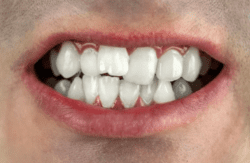Your “bite” is where your top teeth meet your bottom teeth. A dentist will refer to this as a bite regarding your oral health. Think of it as how you “bite” down on food. Your teeth can naturally form issues with your bite, or you can develop them over time. A dentist will call this a “bad bite” or a malocclusion.
Some bite problems are benign, meaning the issues are purely aesthetic. However, some malocclusions can cause significant problems. Adults and children alike can have bite problems. It is important to talk to your dentist about improving your bite problem because it can affect your health over time.

Types of Common Bite Problems
There are a variety of different bite problems, and some of them can be complex. Also, it is possible to have more than one type of bite problem. Here are some of the more common types of bite problems.
Overbite
An overbite happens when the top teeth protrude from the mouth and away from the bottom teeth. Overbites are very common. In fact, most people may note that they have at least a slight overbite.
Overbites can develop from a child sucking their thumb or overusing a pacifier. In addition, it is possible to inherit an overbite genetically. An overbite can also occur through tongue thrusting, teeth grinding, or overly biting nails.
Other than aesthetic issues, overbites can create challenges with speech. Additionally, you can have difficulty opening and closing your mouth. Also, patients with overbites are known to have jaw pain or discomfort.
Underbite
Underbites occur when the lower jaw sits in front of the upper jaw. This is less of an issue with the teeth than with jaw placement. An underbite can give someone a “bulldog” appearance. Like an overbite, thumb sucking, pacifier use, or genetics can cause an underbite.
Over time, an underbite can cause worn teeth and problems with the jaw joint. In addition, patients with an underbite are more likely to develop TMJ, a dysfunction in the jaw joint.
Crowding
Crowding refers to a lack of space in the mouth to house all the teeth. Sometimes a patient will have large teeth or a smaller jaw–potentially both. This doesn’t leave sufficient space for teeth to sit correctly.
If you do not fix crowded teeth, it can be difficult to clean thoroughly. Unfortunately, this can lead to cavities, tooth decay, and gum disease.
Spacing
The opposite issue of crowding is spacing. Spacing is when there is too much space between teeth. It is also hard to properly clean teeth and avoid tooth decay or gum disease problems. In addition, with spacing issues, patients are more likely to have food stuck in between their teeth. This can create cavities without a stringent oral health routine.
Open Bite
Another common bite problem is called an open bite. An open bite happens when the back teeth touch when the jaw is closed, but the front teeth do not overlap. Specifically, this refers to an anterior open bite.
A posterior open bite is when the front teeth touch when the mouth is closed, but the back teeth do not.
